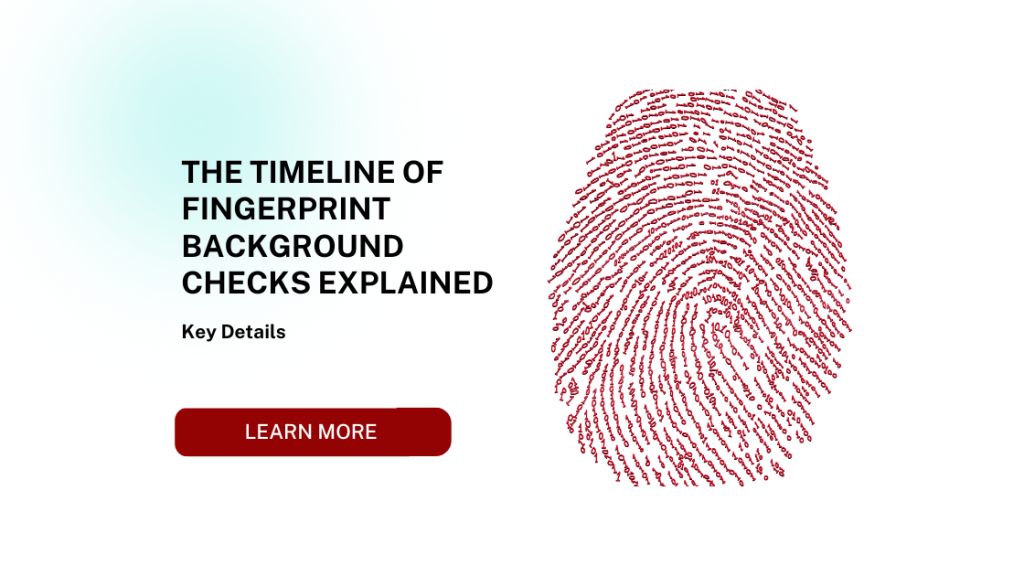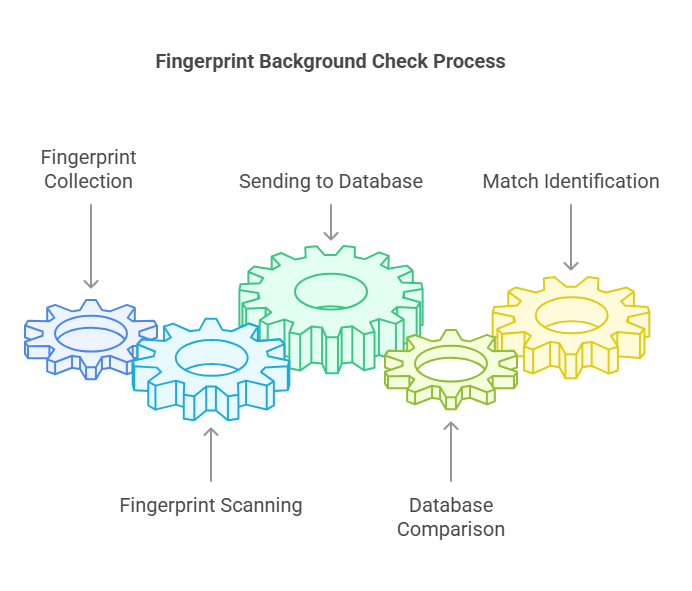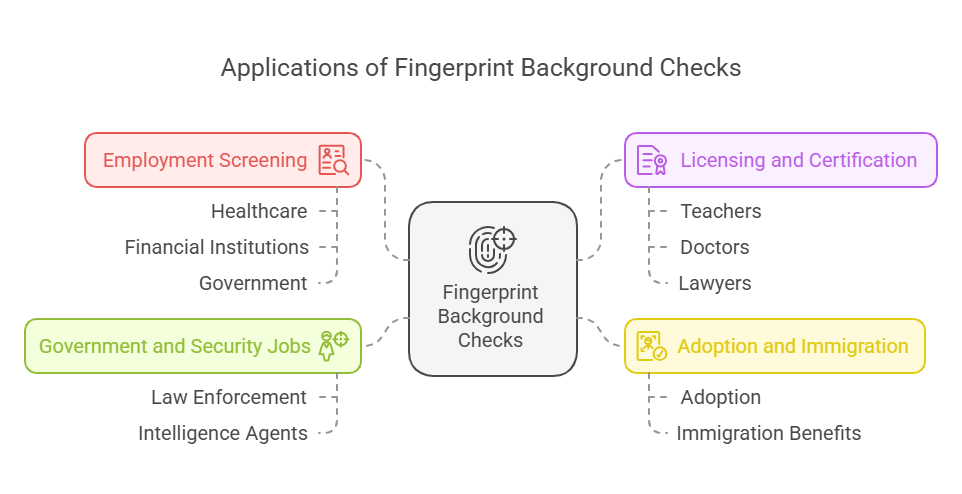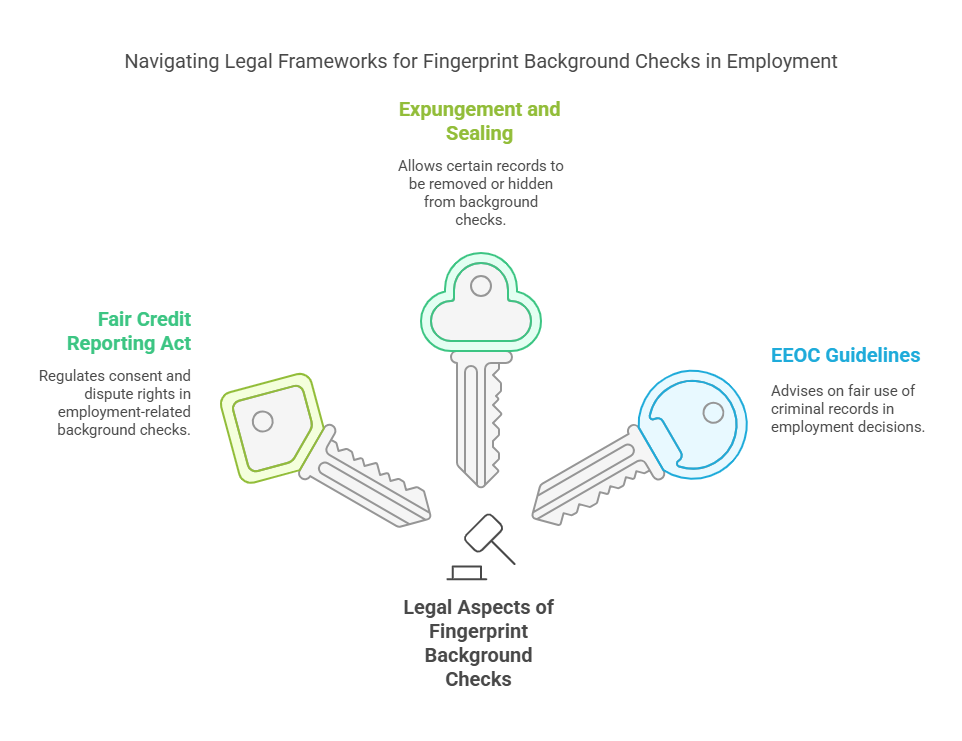The Timeline of Fingerprint Background Checks Explained

What Is a Fingerprint Background Check?
A fingerprint background check is a process where an individual’s fingerprints are collected and analyzed to determine if they have a criminal record. The fingerprints are submitted to local, state, and/or federal criminal databases for comparison, enabling authorities to check if there are any prior criminal activities associated with the individual. These checks can reveal a wide range of criminal offenses, including misdemeanors, felonies, and even arrests that did not result in convictions.
How Do Fingerprint Background Checks Work?

Fingerprint background checks work through a process called Automated Fingerprint Identification System (AFIS). When an individual’s fingerprints are taken, they are scanned and sent to a fingerprint database (local, state, or federal). The system compares the collected fingerprints with millions of records in the database to match any criminal history associated with the individual. Depending on the agency conducting the check and the type of check being requested, the scope and duration of the search can vary.
Why Are Fingerprint Background Checks Important?
Fingerprint background checks serve multiple purposes in safeguarding both individuals and organizations. Some of the primary reasons include:
- Ensuring Safety: Employers in industries such as healthcare, childcare, finance, and law enforcement rely on fingerprint checks to ensure they are hiring individuals with no history of violence, theft, or fraud.
- Preventing Fraud: In roles involving financial responsibilities, fingerprint background checks help mitigate the risk of hiring individuals who might engage in embezzlement, money laundering, or fraud.
- Licensing and Compliance: Many states require fingerprint background checks for individuals seeking professional licenses (e.g., healthcare workers, attorneys) to ensure that they meet regulatory standards.
Common Scenarios Where Fingerprint Background Checks Are Used

Fingerprint background checks are utilized in various sectors, including:
- Employment Screening: Many employers, especially in sensitive sectors (e.g., healthcare, financial institutions, government), use fingerprint checks to verify the criminal history of job applicants.
- Licensing and Certification: Certain professional certifications and licenses, such as those for teachers, doctors, or lawyers, may require fingerprint background checks to ensure the applicant has no criminal history.
- Adoption and Immigration: Fingerprint checks are often a requirement for individuals applying to adopt children or seeking immigration benefits, as authorities use them to verify that the applicants are not involved in criminal activities.
- Government and Security Jobs: Government agencies and organizations dealing with national security often require fingerprint checks to screen candidates for sensitive positions, such as law enforcement officers or intelligence agents.
Factors Influencing How Far Back a Fingerprint Background Check Can Go
There are several key factors that determine how far back a fingerprint background check can go:
- Jurisdiction: Federal, state, and local laws vary on how long criminal records are retained. For instance, some states may keep records indefinitely, while others may have a time limit on how long an arrest or conviction is accessible.
- Type of Record: The type of crime (e.g., misdemeanor, felony) can affect the retention period of records. Felony convictions tend to stay on record longer than misdemeanors.
- Purpose of the Check: The purpose behind the fingerprint check also plays a role. For example, checks for high-security government jobs may go back further compared to checks for general employment or licensing.
How Far Back Do Fingerprint Background Checks Typically Go?
Fingerprint background checks can vary in how far back they go, depending on several factors. Generally, here’s what you can expect:
- Federal Checks: A federal fingerprint check typically looks for criminal records in the FBI database. In most cases, criminal records from any time in an individual’s life can be included, especially felonies. Some federal agencies may also use more specific databases, depending on the applicant’s role.
- State Checks: Each state has its own policies regarding the length of time criminal records are retained. Most states will keep records indefinitely, but some may have limits for certain types of offenses. For example, certain states may only report crimes committed in the last 7 years, while others may report the entire criminal history.
- Local Checks: Local police departments may also perform fingerprint background checks, which typically focus on records specific to their jurisdiction. These records can be more limited, as they only include crimes committed within that particular city or county.
State and Federal Laws Regarding Record Retention
The length of time a fingerprint background check goes back largely depends on the record retention policies enforced by state or federal laws. While federal checks can access national criminal records indefinitely, state and local jurisdictions may have restrictions. Some states will only retain felony convictions indefinitely but may restrict access to misdemeanors or arrests that didn’t result in convictions after a certain period.
How to Determine the Scope of a Fingerprint Background Check
When conducting a fingerprint background check, the entity requesting the check (e.g., an employer or licensing agency) can often specify the scope of the search. This means they can determine whether to search:
- Only the most recent offenses (within the past 7 years or so),
- All criminal history, or
- Specific types of crimes (e.g., violent offenses, financial crimes).
The type of check can also depend on the nature of the job or license being applied for.
State-wise Retention Practices
| State | Retention Period for Felony Records | Retention Period for Misdemeanors |
|---|---|---|
| California | Indefinite | 7 years |
| Texas | Indefinite | 5 years |
| Florida | Indefinite | 7 years |
| New York | Indefinite | 10 years |
| Pennsylvania | Indefinite | 5 years |
The Role of Precise Hire in Fingerprint Background Checks
Precise Hire provides comprehensive fingerprint background check services, ensuring that businesses and organizations receive thorough, accurate, and legally compliant background screenings. With access to nationwide databases and expertise in understanding state and federal regulations, Precise Hire helps ensure that businesses and government agencies stay compliant while conducting background checks.
Why Choose Precise Hire?
- Compliance Assurance: Precise Hire ensures your background checks are compliant with federal and state laws, including the Fair Credit Reporting Act (FCRA).
- Accurate Results: With access to the latest databases, Precise Hire provides reliable results that help make informed hiring or licensing decisions.
- Tailored Solutions: Precise Hire offers solutions designed for businesses of all sizes, making sure the background checks fit the specific needs of your industry or role.
Legal Aspects of Fingerprint Background Checks

In the U.S., fingerprint background checks are subject to a number of federal and state regulations designed to protect both employers and job applicants.
- Fair Credit Reporting Act (FCRA): The FCRA regulates how background checks are conducted for employment purposes, including fingerprint checks. Employers must obtain consent from applicants before conducting fingerprint background checks. Additionally, if a negative decision is made based on the results of the check (such as denial of employment), the applicant must be informed and given a chance to dispute the information.
- Expungement and Sealing of Records: Some criminal records, especially older offenses or those resulting in a conviction, can be expunged or sealed under certain conditions. If a record is sealed or expunged, it generally should not appear in a fingerprint background check.
- EEOC Guidelines: The Equal Employment Opportunity Commission (EEOC) has guidelines on how employers should use criminal records in employment decisions. Employers should avoid blanket policies that automatically disqualify applicants based on their criminal history and should consider the nature of the crime, its relevance to the job, and how much time has passed since the offense.
FAQs About Fingerprint Background Checks
- How far back does a fingerprint background check go for government jobs? Government jobs may require background checks that go back several decades, especially for positions related to national security.
- Can expunged records appear in a fingerprint background check? Expunged records should not appear in a fingerprint check. However, some agencies may still be able to access sealed or expunged records depending on their jurisdiction.
- What types of crimes are most commonly revealed through fingerprint checks? Fingerprint background checks can reveal a wide variety of crimes, including felonies, misdemeanors, arrests, and convictions, particularly those related to theft, drug offenses, violent crimes, or fraud.
- How do fingerprint checks differ from name-based background checks? Fingerprint checks are more accurate, as they rely on biometric data, while name-based checks rely on personal identifiers, which can be prone to errors or fraud.
- Do fingerprint background checks include international criminal records? In most cases, fingerprint background checks focus on domestic criminal records. International records may require separate checks depending on the specific job or role.
Conclusion
Fingerprint background checks are an essential tool for ensuring safety, security, and compliance in various sectors. The scope of these checks is influenced by state and federal laws, as well as the nature of the job or license. Understanding how far back fingerprint checks go and ensuring compliance with legal regulations is crucial for both employers and job applicants.
Precise Hire offers comprehensive fingerprint background check services that help businesses make informed hiring decisions while remaining compliant with all applicable laws. By choosing Precise Hire, businesses can trust that they are receiving accurate, timely, and legally compliant background screenings.
